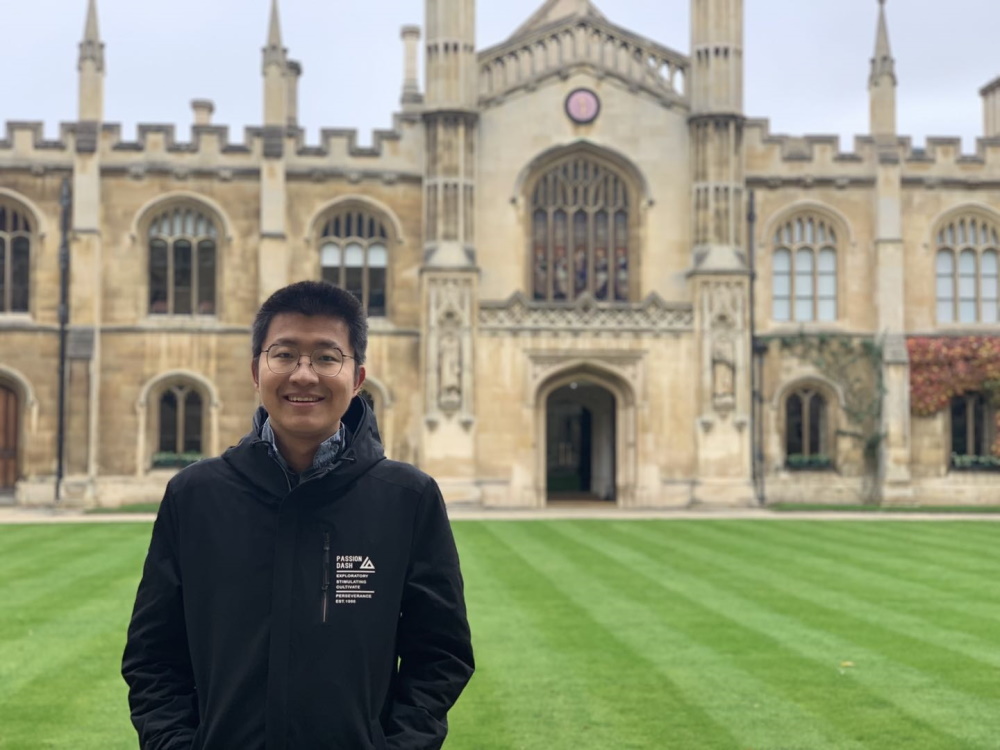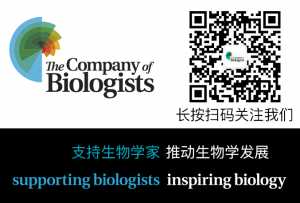
16 November 2020
Dawei Sun has just finished his PhD in Dr Emma Rawlins’ lab at The Gurdon Institute here in Cambridge, UK. He has remained in the city with his wife for the duration of the pandemic. In the middle of the UK’s second lockdown we met him, virtually, to find out how he is doing, hear about the triumphs and tribulations of his PhD, and discuss his experience of studying in the UK.
As a student on the four-year Wellcome Trust Developmental Mechanisms programme, Dawei first joined the Rawlins lab as a rotation student, and then chose the lab to complete his PhD in. His research focuses on understanding human lung development using a newly established 3D organoid culture system. “The organoids consist of human foetal lung epithelial progenitor cells, which can give rise to all types of mature lung epithelial cells,” he explained. “I hope our research will help preterm babies and perhaps also enable future therapeutic lung regeneration.”
“I will always remember the first successful gene targeting that I achieved in our organoid system.”
As with labs around the world, the pandemic caused Dawei to change his plans. “I had planned to finish the experiment I wanted to do at the end of June and then spend the following months writing,” he said. Instead, Dawei used the spring lockdown to write up his thesis, a situation he felt fortunate to be in. “My situation was a lot better than my lab mates. Postdocs and PhD students who were at the beginning of their research could only really read during that time.”
Reflecting on his PhD, Dawei talks about a moment that will stay with him. “I will always remember the first successful gene targeting that I achieved in our organoid system,” he said. Gene targeting has been considered difficult to achieve in the field and reports on its success in other organoid systems are limited. “When I finally achieved this for the first time using our organoids, I ran to show my supervisor the results! I was so happy as this opened the door to being able to precisely manipulate the organoid genome.”
Of course, with the triumphs come the tribulations and Dawei also experienced these during his research. “In my first year of PhD study I was trying to isolate and culture the endothelial cells from human foetal lung samples,” he explained. “Based on previous reports, I expected this to be straightforward.” After a lot of failed attempts, Dawei had to shelve the project. “Only recently, papers are coming out reporting the complexity and heterogeneity of the human lung endothelial cell population. Looking back, I felt that I was too naïve. It’s amazing to learn that after years of research, we still don’t really know the cells well enough.”
“We have all been well trained in science, but there is limited guidance on ‘basic’ skills that are very important for your career.”
Most institutes in Cambridge reopened their doors in June. Labs operated in shifts to limit the number of people there at any one time. Slowly, labs increased their capacity but social distancing is in place and masks are compulsory. “The research is still going on, it is just slower than usual,” said Dawei. “Normally, when I am planning an experiment with an unfamiliar technique I’d ask another lab member for advice. Now it is all via email, which is making it harder to get a quick response, and reagents are taking longer to arrive,” he said. The institute is still advising that its members should only come in if they have wet lab work to do.
Like many PhD students this year, Dawei passed his viva via Zoom. Of the experience, he noted the potential for flexibility for the examiners. “One of my examiners was from Edinburgh. Usually he would have to travel a long way and make time for the trip, but a remote viva meant he could stay at home. I think this means there will be new possibilities in the future.” Dawei’s observations align with the feelings of the rest of the scientific community. “I think there is a space for virtual conferences,” he said. “Speakers and attendees don’t have to travel long distances, and I like the format and concept of them. We do have to be careful how we make these as interactive as possible though.” Dawei is also eager to see more online seminars. “I think they’re a good opportunity. You can more easily invite speakers who might be reluctant to travel or find the time.”
“I’m confident that once we make new friends, get through COVID and embrace the culture, the journey will pay you back with a better sense of self and a new way of thinking.”
Dawei has lived in the UK for five years now. When he needs a break from science, there are lots of events going on in Cambridge and London is only 50 minutes away. “I like Cambridge and PhD students in the UK have less pressure for publications. This has allowed me to explore projects with a ‘higher risk’. I would also like to mention that I was very grateful for the visa policy here in the UK, which has allowed me to easily go back home and visit my family.”
As he enters his next career step as a postdoc, Dawei shares his opinions on life as an early-career researcher. “We have all been well trained in science, but there is limited guidance on ‘basic’ skills that are very important for your career, such as ‘how to give a good presentation’ and ‘how to write a grant application’,” he said. Work-life balance and mental health are also areas he thinks deserve more attention to help early-career researchers build their resilience. “I’m very grateful for my supervisor, who has been extremely considerate and cared about both of these aspects in the lab.”
We end the interview with Dawei’s advice to others thinking about moving abroad for further study, and his answer resonates far beyond the academic community. “Don’t be afraid. The loneliness, anxiety, pandemic uncertainty, language barrier and culture shock can be intimidating. I’m confident that once we make new friends, get through COVID and embrace the culture, the journey will pay you back with a better sense of self and a new way of thinking.”

This interview was originally published on our Company WeChat channel. If you have WeChat, follow us for weekly Company news, interviews and summaries of the latest research.








You must be logged in to post a comment.